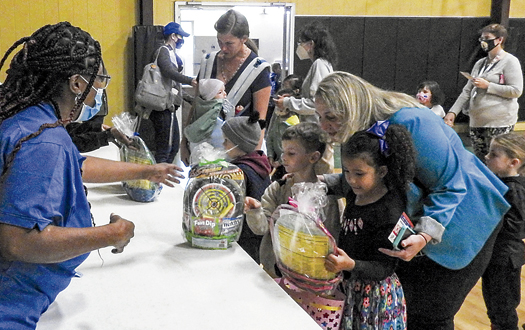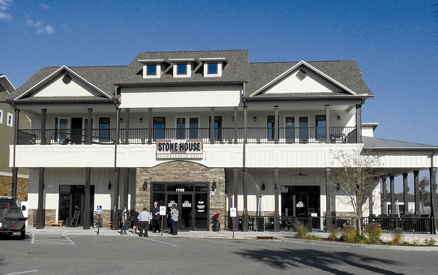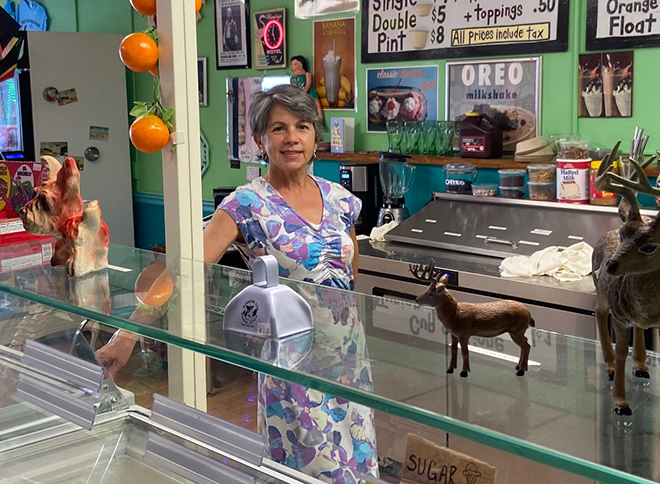NEWBERRY ‒ The pandemic was hard on businesses and the economy in 2020, especially on small local businesses. For some family-owned small businesses, there was a small reserve of funds helping them survive during Covid-19 related shutdowns. Others were not so fortunate and were forced to close their doors. Yet others decided to take a chance, follow their dreams and start new businesses amid uncertainties.
The planned community of townhomes and single-family houses in Newberry’s Country Way Town Square was designed as a golf cart-friendly community next to Newberry High School. The concept was to provide not only a variety of housing in a community environment, but also to provide a retail area in the town center so residents could have services within walking or golf cart distance. It was also designed as an event and entertainment location that has hosted the Newberry Watermelon Festival and rodeos.
On March 11, Stonehouse Grill had a ribbon cutting to celebrate the restaurant’s opening. Although the eatery began serving lunch and dinners a month ago, the official opening was delayed until everything from the food to the service was in order. Jay Krecker and wife Katie are co-owners, and although this is their first venture into ownership, they have over 20 years of experience in all aspects of the industry, from bartending and serving to management.
“It's always been a dream of mine to operate my own restaurant with exceptional recipes and service, and this opportunity came up so we took it,” Jay Krecker said.
Krecker was the general manager of Gator Dockside for 15 years before making the move. His assistant manager there also joined him as general manager at Stonehouse.
“I had worked with Jay for almost 15 years and knew his capabilities in this industry, so when he asked me to come with him in this new venture I immediately accepted,” said general manager Jamie Sulecki. “I was not the only one; there were several other employees that left to work here with him.”
The extensive menu includes several selections of steaks, from prime rib to porterhouse, ribeye and sirloin. There are also a variety of burgers (including a vegetarian Beyond Burger), sandwiches, ribs, and seafood. Salad options also are available. The location offers outdoor patio seating as well as a full bar.
“Besides being a new and different restaurant for the general public, we want this to be a destination place for the community of Country Way to come relax and gather,” Sulecki said.
The restaurant is open Monday through Thursday from 11 a.m. - 10 p.m., Friday and Saturday: 11 a.m. - 11 p.m. and Sunday 11 a.m. - 9 p.m. The full menu is available at https://www.stonehousenewberry.com/
After eating steak dinners at the Stonehouse Grill Health, they can walk across the plaza to the other new business in the square. Because It Matters (BIM) is a 24-hour full equipped fitness center for cross fit training or traditional workouts. The gym is designed with easy-to-use strength and cardio equipment, a stadium-quality sound system and spacious locker rooms.
“I am a newbie at owning my own fitness business. But it has been a dream for most of my life,” said owner Slade Williams. “I got into fitness when I was 16 and on the school weight lifting team, and it’s been a passion ever since. I work out four to five days a week.”
Williams comes from a farming family and has lived in the area all his life. “My wife, Starla, and I have gotten to a position where we could finally afford to open a business. I have been friends with Tripp Norfleet who built the Country Way development and when he told me they were opening retail in the town square I decided it was time to take the opportunity,” Williams said.
“We made sure we have top of the line equipment including 30 pieces of cardio machines, treadmills, mechanical and free weights. We also offer classes, but to stay in compliance with the health guidelines, we are teaching them outdoors with social distancing between participants.”
Inside the building a UV Germicidal light treatment serves all air systems for top-tier cleanliness. Gym memberships range from $35 to $40 a month, and there is a 10 percent membership discount for military and first responders. Because It Matters Fitness is located in Newberry at 24850 S.W. 17th Place in the Country Way community. More information can be found at https://becauseitmattersfitness.com or by calling 352-660-3803.
# # #
Email rcarson@
alachuatoday.com






